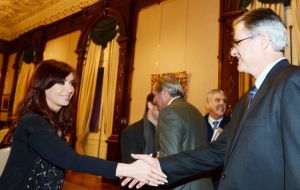MercoPress. South Atlantic News Agency
Argentine economy conditioned by energy imports and subsidized fuels and power
 Last month Cristina Fernandez signed a controversial ‘tailor-made’ decree which openly favours US oil company Chevron
Last month Cristina Fernandez signed a controversial ‘tailor-made’ decree which openly favours US oil company Chevron If the Argentine government does not manage to stabilize its energy balance, which is one of the main drains of US dollars, the ban on hard currency purchases, the barriers to imports and the growing obstacles to spend money overseas for Argentine travellers will continue and could worsen, according to Buenos Aires analysts.
The government of President Cristina Fernandez is desperately trying to contain the erosion of the Central bank international reserves, which took off in early 2011 because of the growing fuels’ bill. In October 2011 her government banned the purchase and hoarding with US dollars. Three months later she imposed further obstacles to imports. In August 2012 debit and credit card consumption overseas was taxed 15% and it increased to 20% last March.
“The fall in the trade surplus of the Argentine economy in the first half of the year is almost equal to the red caused by the increased energy imports’ bill” said economist Rodrigo Alvarez from Analytica.
In the first half of 2013 the imports of natural gas, liquid gas, fuel oil, gas oil soared 22.6% while exports dropped 19% compared to the previous year. This meant that the impact of the energy deficit jumped from 1.67bn dollars in six months of 2012 to 3.25bn this year.
The negative impact of the energy bill despite strong limitations on imports and an increase in grains and oilseed exports, could not prevent the trade surplus of the first half of the year to be 25% inferior to the same period a year ago. The 1.7bn missing from the trade surplus is closely followed by analysts because Argentina with no access to global money markets must appeal to the trade surplus for dollars.
According to the Argentine Institute on Fiscal Analysis energy imports this year will demand from Argentina 13.28bn dollars which is equivalent to 46% of all agriculture exports. This compares with 6% in 2003 and 21% in 2010.
But the energy deficit not only impacts on Argentina’ trade balance. To keep domestic fuel and energy prices frozen, the volume of subsidies increases year after year. In the first half of this year subsidies climbed to 35.9 billion Pesos equivalent to 6.9bn dollars, which is 62.2% higher than in the same period of 2012, points out the Argentine Association of Budgets and Public Finances administration. But subsidies despite the government’s preaching for the poor and needy end mostly subsidizing electricity and cooking gas for mid and high income groups.
Energy subsidies are one of the main causes why the fiscal deficit is jumping to 3% of GDP, and is financed with money printing to the tune of 30% annually, which further puts pressure on inflation and the ‘blue or parallel’ exchange rate.
The reduction in the trade surplus and the increase in the energy deficit has been the result of the Nestor and Cristina Kirchner administrations policies of freezing production prices. As a result from 2003 to 2013, gas production has dropped 16%, and the tendency continues this year although somehow abated to 7.2%.
Forced by the energy deficit, falling trade surplus and soaring fiscal expenditure, Cristina Fernandez last 11 July signed a controversial decree with exceptional benefits for oil companies such as the right to export 20% of production with no fees, (in five years time) ant the free disposal of benefits for all those investing over a billion dollars.
The opposition called it a ‘tailor-made’ suit for US oil company Chevron which signed on 16 July an agreement with the government’s YPF to develop the Vaca Muerta shale deposits with the promise of investing 1.24bn dollars.
However such results will only become tangible in the midterm. In the meantime the red energy deficit threatens to continue bashing the economic system mounted by the Kirchners. In effect it is one of the main reasons why Argentina from a ‘twin’ surplus condition (fiscal and trade) and a sustained increase in international reserves, ended with a growing fiscal deficit, a loss of 6.3bn dollars of international reserves in the first half and very strict import restrictions that have infuriated Mercosur partners.
“The current scenario forces the Argentine government to decide whether to look after international reserves plus imports’ controls or favour the growth of the economy. Until the mid term elections of October it is clear that the priority will be to stimulate growth, but after October things are going to get really tight”, advanced Alvarez.
However whatever the measures implemented and the course decided, the current energy policy implemented by Argentina since the Kirchners took office in 2003, has had a heavy burden for the country. Former Energy Secretary Daniel Montamat estimates that the fall in Argentine energy reserves (because of consumption and no replenish incentives) is equivalent in money terms to over 180 billion dollars.




Top Comments
Disclaimer & comment rules-

-

-

Read all commentsNo surprises here then!
Aug 05th, 2013 - 02:32 am 0Posters here have been saying (including my good self)for years.
Tobi.....all of the tobi's....are you all reading this?
Aug 05th, 2013 - 05:53 am 0http://uk.reuters.com/article/2013/08/02/uk-argentina-economy-analysis-idUKBRE9710KH20130802
Aug 05th, 2013 - 06:10 am 0Saw this earlier. Interesting read...
Commenting for this story is now closed.
If you have a Facebook account, become a fan and comment on our Facebook Page!